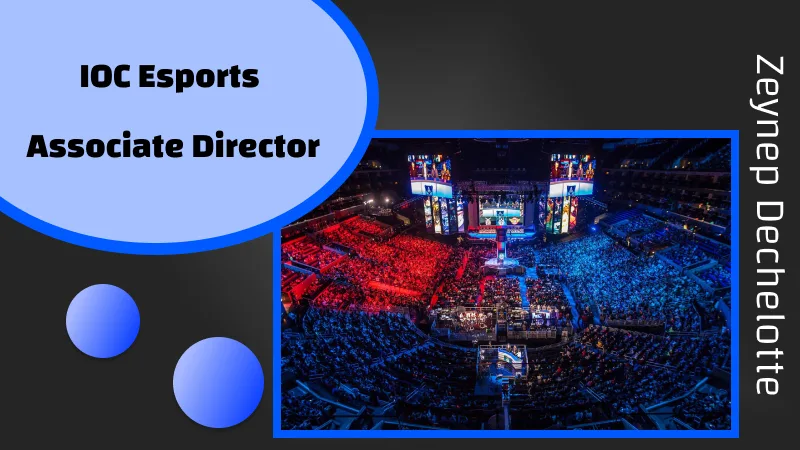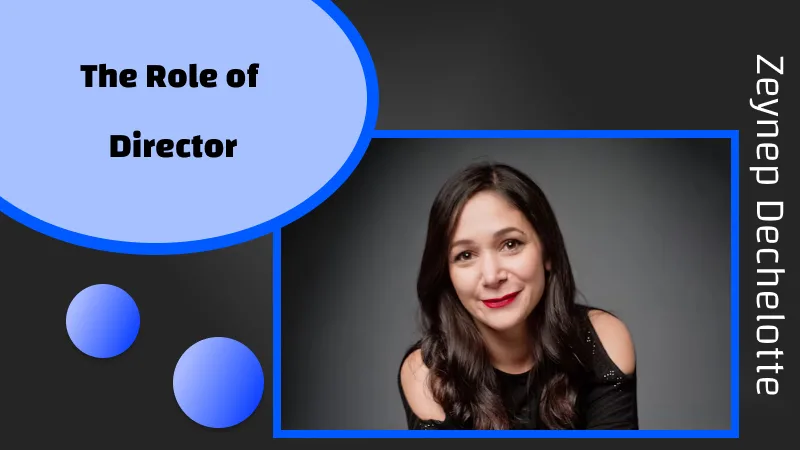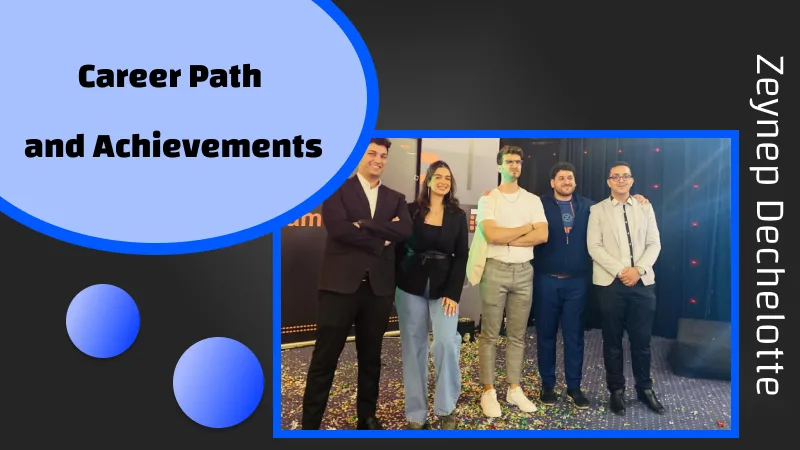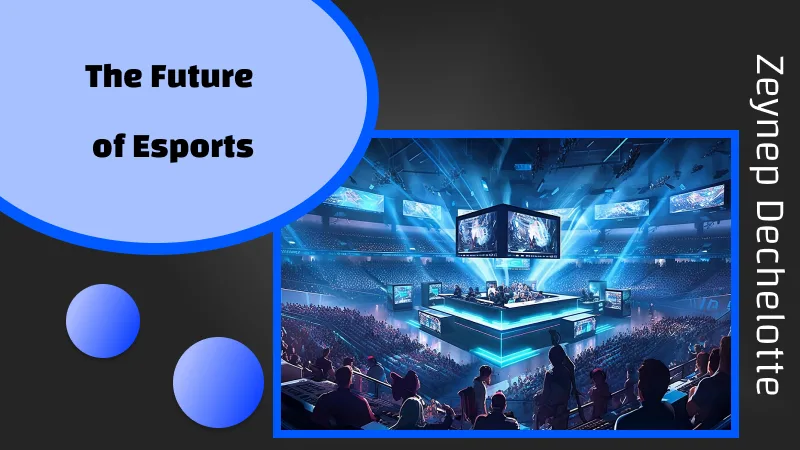Discover how Zeynep Dechelotte is revolutionizing esports in the Olympics, driving innovation and strategic growth at the International Olympic Committee.
Zeynep Dechelotte: Shaping the Future of Esports in the Olympics
As the newly appointed IOC Esports Associate Director, Zeynep Dechelotte brings her vast experience to lead the integration of esports in the Olympics, enhancing esports governance and strategic developments at the International Olympic Committee․
Zeynep Dechelotte Appointed as IOC Esports Associate Director

The International Olympic Committee recently announced the significant appointment of Zeynep Dechelotte as the IOC Esports Associate Director․ With a wealth of experience in esports leadership, Dechelotte is set to lead the development and integration of esports in the Olympics․ Her appointment marks a pivotal moment for Olympic esports developments and reinforces the IOC’s commitment to embracing the digital age․ Dechelotte’s role will involve guiding the IOC esports strategy, ensuring effective collaboration with various stakeholders, including the International Esports Federation; She is expected to bring her strategic vision and expertise to enhance the governance framework, thereby promoting an inclusive and competitive environment for esports globally․ This appointment underscores the increasing recognition of esports as a vital component of modern sports culture, aligning with the IOC’s evolving mission to innovate and engage new audiences worldwide․
Details of the Appointment
The appointment of Zeynep Dechelotte as the IOC Esports Associate Director was officially announced in November 2024, a strategic move by the International Olympic Committee to strengthen its focus on esports governance․ This role places Dechelotte at the forefront of integrating esports in the Olympics, where she will leverage her extensive expertise to enhance the IOC’s approach towards digital sports․ Her appointment is aligned with the IOC esports strategy, aiming to establish a more robust framework for esports events․ She will be responsible for collaborating with key stakeholders and ensuring that the initiatives align with the broader objectives of the Olympic movement․ The decision to appoint Dechelotte underlines her proven track record in esports leadership and reflects the growing importance of esports within the global sporting landscape, marking a transformative era for Olympic esports․
Background of the Appointment
The appointment of Zeynep Dechelotte as IOC Esports Associate Director is rooted in her extensive background in the esports industry, where she has accumulated vast experience and knowledge․ Prior to joining the International Olympic Committee, Dechelotte held significant leadership positions within major gaming companies, such as Ubisoft, where she served as Senior Esports Director․ Her expertise in managing large-scale esports events and fostering strategic partnerships made her a prime candidate for this pivotal role․ The decision to bring Dechelotte on board aligns with the IOC’s vision to integrate esports into the Olympic framework effectively․ Her understanding of both traditional sports and digital gaming environments positions her uniquely to navigate the complexities involved in merging these worlds․ This appointment highlights the IOC’s commitment to adapting to new sporting trends and embracing innovation in global sports governance․
Significance in Esports Governance
The appointment of Zeynep Dechelotte as the IOC Esports Associate Director holds significant implications for the advancement of esports governance․ Her role is pivotal in shaping policies that ensure fair play, integrity, and inclusivity within the emerging landscape of esports in the Olympics․ By establishing a robust regulatory framework, Dechelotte aims to align esports with the values and standards of traditional Olympic sports․ This strategic move by the International Olympic Committee underscores its dedication to integrating esports responsibly while addressing challenges such as cheating, doping, and player welfare․ Her efforts will focus on creating partnerships with global stakeholders, including the International Esports Federation, to harmonize rules and foster sustainable growth․ Dechelotte’s leadership marks a transformative era in bridging traditional sports governance with digital innovation, setting new benchmarks for future developments․
The Role of IOC Esports Associate Director

The position of IOC Esports Associate Director, held by Zeynep Dechelotte, is critical in steering the evolution of esports in the Olympic domain․ This role involves overseeing the strategic integration of esports initiatives, ensuring they align with the core values and objectives of the International Olympic Committee․ Dechelotte will be responsible for coordinating with various stakeholders to develop comprehensive strategies that promote esports as a legitimate and recognized component of the Olympic movement․ Her duties include establishing partnerships, managing resources, and creating policies that enhance the competitive integrity and global reach of esports․ Additionally, she will spearhead efforts to engage younger audiences and cultivate new opportunities within the esports sector․ This role demands a visionary approach to blend traditional sports ethos with the dynamic nature of digital gaming, fostering innovation and inclusivity․
Responsibilities and Objectives
As the IOC Esports Associate Director, Zeynep Dechelotte is tasked with a set of critical responsibilities aimed at advancing esports integration within the Olympic framework․ Her primary objective is to develop and implement strategies that align esports with the Olympic values of excellence, respect, and friendship․ This includes creating a governance structure that ensures fair play and competitive integrity while fostering inclusivity and diversity among participants․ She will also focus on building partnerships with key stakeholders, such as gaming developers and esports organizations, to promote sustainable growth and innovation in the sector․ Additionally, Dechelotte aims to enhance audience engagement by leveraging digital platforms to reach younger demographics․ By setting clear objectives and executing them effectively, her role is pivotal in ensuring that esports becomes an integral part of the Olympic movement, reflecting its evolving nature and global appeal․
Strategic Importance for IOC Esports Strategy
The role of Zeynep Dechelotte as the IOC Esports Associate Director is strategically vital for shaping the future of esports within the Olympic movement․ Her position allows her to influence and drive the IOC esports strategy, ensuring it aligns with the broader goals of the International Olympic Committee․ This strategic focus involves integrating esports into the Olympic agenda, fostering collaboration between traditional sports and digital competitions․ By leveraging her expertise, Dechelotte aims to create a comprehensive framework that supports sustainable growth and innovation in the esports sector․ Her efforts will also focus on enhancing the global visibility and acceptance of esports as a legitimate, competitive discipline․ This strategic direction not only elevates the status of esports but also opens new avenues for engaging diverse audiences, contributing to the dynamic evolution of the Olympic Games․
Integration with the International Olympic Committee
The integration of esports within the International Olympic Committee (IOC) framework is a key responsibility for Zeynep Dechelotte as the IOC Esports Associate Director․ Her role involves bridging the gap between the traditional values of the Olympics and the innovative nature of esports․ This integration requires careful planning and execution to align esports events with the IOC’s standards of excellence, integrity, and inclusivity․ Dechelotte’s task is to ensure that esports are not only recognized but also celebrated as a part of the Olympic movement, fostering new opportunities for collaboration across sports disciplines․ By working closely with various committees and stakeholders, she aims to embed esports into the Olympic agenda, enhancing its prominence and appeal worldwide․ This strategic integration highlights the IOC’s commitment to embracing modern sports trends and ensuring their seamless incorporation into the global sporting community․
Zeynep Dechelottes Career Path and Achievements

Zeynep Dechelotte has paved a distinguished career path in the esports industry, marked by noteworthy achievements that have shaped her professional journey․ Prior to her role as IOC Esports Associate Director, she held significant positions at leading gaming companies like Ubisoft, where she excelled as Senior Esports Director․ Her career is characterized by her strategic vision and leadership in managing large-scale esports events, fostering global partnerships, and promoting diversity within the industry․ Dechelotte’s achievements include spearheading initiatives that enhanced the competitive landscape of esports and broadened its audience reach․ Her commitment to innovation and excellence has earned her recognition as a key influencer in the esports community․ Through her leadership roles, she has successfully bridged traditional sports management with digital gaming, positioning her uniquely to lead the integration of esports within the Olympic movement․
Professional Background and Experience
Zeynep Dechelotte boasts a rich professional background, with extensive experience in the esports and gaming sectors․ Her journey began with notable roles in top-tier organizations, including her tenure at Ubisoft as Senior Esports Director․ Throughout her career, she has demonstrated exceptional leadership, managing global esports operations and driving strategic initiatives that have elevated competitive gaming to new heights․ Dechelotte’s expertise spans across event management, partnership development, and audience engagement, making her a pivotal figure in the esports landscape․ Her educational credentials, combined with hands-on experience, have equipped her with the skills necessary to navigate the complex dynamics of digital sports․ This depth of experience positions her well to lead innovative projects and collaborations within the International Olympic Committee, ensuring that esports is seamlessly integrated into the broader sports ecosystem․
Previous Esports Leadership Positions
Before assuming her current role at the International Olympic Committee, Zeynep Dechelotte held several influential esports leadership positions that showcased her strategic acumen and industry insight․ Serving as Senior Esports Director at Ubisoft, she was instrumental in shaping the company’s competitive gaming initiatives, overseeing major projects that expanded Ubisoft’s presence in the global esports arena․ Her responsibilities included developing innovative tournament formats, fostering community engagement, and building partnerships with key stakeholders in the gaming industry․ Prior to Ubisoft, Dechelotte worked with various organizations where she honed her skills in esports management, gaining invaluable experience that contributed to her reputation as a forward-thinking leader․ These roles equipped her with the knowledge and expertise needed to navigate the fast-paced world of esports, preparing her to effectively lead its integration into the Olympic framework․
Contributions to the Esports Industry
Zeynep Dechelotte has made significant contributions to the esports industry, influencing its growth and evolution on a global scale․ Her strategic vision and leadership have been pivotal in advancing competitive gaming standards, ensuring fair play, and fostering inclusivity across numerous platforms․ Through her initiatives, she has championed the development of innovative tournament structures that enhance viewer engagement and player experience․ Dechelotte’s efforts in building robust partnerships with gaming developers and sponsors have led to increased investment and interest in esports, elevating its profile as a mainstream sport․ Additionally, her advocacy for diversity and representation within the industry has paved the way for broader participation from underrepresented groups․ These contributions have not only strengthened the esports ecosystem but also positioned it as a dynamic and integral part of the modern sports landscape․
The Future of Esports in the Olympics

The future of esports in the Olympics holds vast potential, promising to redefine the landscape of global sports competitions․ With the appointment of Zeynep Dechelotte as the IOC Esports Associate Director, there is a dedicated pursuit to integrate esports into the Olympic framework effectively․ This integration aims to bridge the gap between traditional and digital sports, creating new opportunities for athletes worldwide․ The focus will be on developing standardized regulations, enhancing the legitimacy and recognition of esports as an Olympic discipline․ Innovations such as virtual reality experiences and interactive platforms could transform how audiences engage with the Olympics․ As esports continues to grow in popularity, its inclusion in the Games represents a forward-thinking approach by the International Olympic Committee, ensuring the Olympic movement remains relevant and inclusive in the digital age․
Potential Developments and Innovations
The integration of esports in the Olympics opens a gateway for numerous potential developments and innovations․ As this digital sport becomes part of the Olympic movement, we can anticipate advancements in technology-driven spectator experiences, such as virtual reality broadcasts and interactive streaming platforms that enhance viewer engagement․ The incorporation of esports also encourages the development of comprehensive training programs tailored to esports athletes, improving performance and fostering professionalism․ Moreover, the establishment of standardized rules and guidelines will legitimize esports competitions on a global scale, ensuring fair play and integrity․ Partnerships between traditional sports entities and esports organizations could lead to hybrid events, merging physical and digital competition formats․ These innovations promise to revolutionize how audiences engage with the Olympics, drawing in younger demographics and expanding the Games’ global reach and appeal․
Role of the International Esports Federation
The International Esports Federation (IESF) plays a crucial role in shaping the landscape of esports, especially concerning its integration into traditional sports frameworks like the Olympics․ As a governing body, the IESF sets global standards for competitive gaming, ensuring consistency and fairness across international tournaments․ Their efforts in promoting esports as a legitimate sporting discipline have been instrumental in garnering recognition from entities like the International Olympic Committee․ The federation’s initiatives focus on fostering collaboration between national esports organizations, enhancing player welfare, and advocating for inclusivity․ By establishing unified regulations and ethical guidelines, the IESF paves the way for esports to be embraced by mainstream sports communities․ Their collaboration with the IOC is pivotal in creating a seamless transition for esports’ inclusion in the Olympic program, opening new avenues for growth and acceptance․
Challenges and Opportunities
The integration of esports in the Olympics presents both significant challenges and exciting opportunities․ Among the challenges, establishing a standardized set of rules and regulations that align with traditional Olympic values is paramount․ Ensuring fair play, combating cheating, and addressing issues related to game violence are critical concerns that need careful consideration․ Additionally, bridging the cultural gap between esports enthusiasts and traditional sports audiences requires innovative engagement strategies․ However, these challenges also bring opportunities for growth․ By embracing esports, the Olympics can tap into a younger, digitally-savvy demographic, expanding its global reach and relevance․ The collaboration between established sports bodies and esports organizations can lead to innovative event formats and engaging content delivery methods․ Successfully navigating these challenges will pave the way for esports to become an integral part of the Olympic tradition․
Impact of Zeynep Dechelotte’s Appointment on the Esports Industry
The appointment of Zeynep Dechelotte as the IOC Esports Associate Director significantly impacts the esports industry by elevating its status within the global sports community․ Her extensive experience and strategic vision are expected to drive substantial progress in integrating esports into the Olympic framework, legitimizing it as a mainstream sport․ This move signals a shift towards greater recognition and acceptance of esports, opening up new avenues for investment, sponsorship, and collaboration with traditional sports entities․ Dechelotte’s leadership is anticipated to foster innovation in tournament structures and participant engagement, setting new standards for competitive gaming․ Her role will likely inspire other organizations to embrace esports, enhancing its growth globally․ As a result, her appointment is poised to catalyze transformative changes, offering the esports industry unprecedented opportunities for expansion and development․
Influence on Esports Management
Zeynep Dechelotte’s appointment as IOC Esports Associate Director is poised to significantly influence esports management by infusing it with innovative strategies and structured governance․ Her role emphasizes the importance of establishing clear regulatory frameworks, which are crucial for standardized esports competitions globally․ This approach not only enhances credibility but also attracts investment and sponsorships from mainstream sports sectors․ Dechelotte’s leadership encourages the adoption of best practices in player welfare, ethical standards, and organizational efficiency within esports entities․ By fostering collaborations between traditional sports organizations and esports firms, she aims to create a sustainable ecosystem that supports both competitive integrity and commercial growth․ Her influence extends to developing educational initiatives that equip aspiring managers with the skills needed to navigate the rapidly evolving esports landscape, ultimately professionalizing the industry and ensuring its long-term success․
Reactions from Esports Industry News
The appointment of Zeynep Dechelotte as IOC Esports Associate Director has garnered significant attention from esports industry news outlets, highlighting the potential transformative impact on global esports governance․ Many commentators view this move as a pivotal moment for esports, signaling increased legitimacy and recognition within the traditional sports arena․ Analysts have praised the International Olympic Committee for selecting someone with Dechelotte’s experience and vision, noting her track record in driving strategic initiatives․ Articles emphasize how her leadership could catalyze advancements in esports infrastructure and the development of universal standards․ The general sentiment is optimistic, with expectations that her influence will foster deeper collaborations between esports organizations and established sports bodies․ This appointment is seen as a progressive step towards integrating digital sports into mainstream platforms, opening new opportunities for growth and innovation․
Long-term Effects on Olympic Esports Developments
The appointment of Zeynep Dechelotte as IOC Esports Associate Director is expected to have profound long-term effects on the development of esports within the Olympic framework․ Her strategic leadership will likely lead to the establishment of robust guidelines and organizational structures that integrate esports seamlessly into the Olympic Games․ This foundational work is anticipated to attract a new generation of athletes and audiences, ensuring the longevity and relevance of the Olympic movement in a digital age․ Furthermore, Dechelotte’s influence could drive investment in esports infrastructure and training programs, elevating the competitive standards globally․ By fostering international collaboration, she aims to create a unified approach to esports governance, enhancing its credibility and appeal․ These efforts lay the groundwork for sustainable growth, positioning esports as a permanent fixture in future Olympic events․
